Recruitment and retention resources
| Site: | ART Online |
| Course: | Recruitment and Retention Resources |
| Book: | Recruitment and retention resources |
| Printed by: | Guest user |
| Date: | Saturday, 23 November 2024, 12:35 PM |
1. Planning for success
These recruitment and retention resources guide you through the recruitment process. They start by asking the question, what do you want to achieve rather than with what you are going to do. Only when you have answered this question do they move onto thinking about what type of people you would like to recruit and how you’re going to recruit them.
The recruitment toolbox allows you to plan for success and covers all the important things that need to be considered. It is a four-page word document that guides you through the recruitment process, asking questions and suggesting help. It's completely editable so that you can design your own recruitment plan.
1.1. What do you want to achieve?
What you do and how you do it will depend on the long term aspirations, commitment and skills set of you and your band. Any significant mismatch between your recruits and existing ringers can lead to the band becoming disillusioned, your new recruits drifting away or ringing leaders/teachers suffering from burn-out.
So, begin by deciding what you want to achieve, rather than what you are going to do. When you are clear about this it will be a lot easier to decide who to target, how to get them into your tower, and keep them there.
How many new recruits do you want?
A low-level steady flow of new recruits
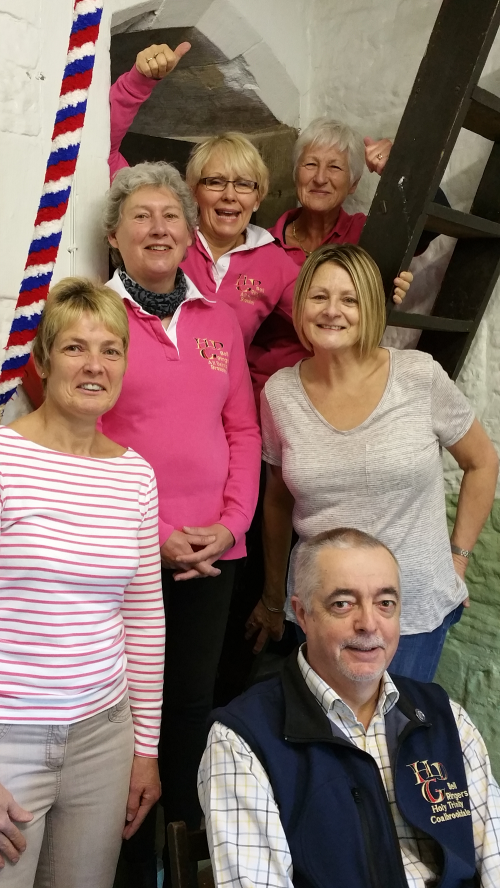
Your band is doing well and you want a slow, steady stream of new recruits to keep the band young and fresh. Aim to increase general awareness of local bell ringing and bell ringers using a wide range of different media and networks. If potential ringers can find you and make the decision to learn to ring by their own self-interest and motivation, they are more likely to commit long-term. This isn’t about a big event, its about a steady drip-feed of news with a clear and welcoming “call to action”.
An injection of new recruits or to build a band from scratch
For recruitment on this scale you need to be thinking of events and mass communication. It is quite possible to recruit a band in one go even in relatively small communities. Make sure you plan an engaging event AND for what comes afterwards. This is a long term project so make sure you are building on strong foundations of local leadership and committed support.
A large scale recruitment project
Big recruitment events do work. They tend to be longer in the planning and require quite a lot of people to work together over a longer period of time. It is a great opportunity to bring together people who don’t often ring together and make great use of people’s non-ringing skills. Make sure you have a good plan to hand-over from a central organisation to local towers. This is a great way of breaking down boundaries and facilitating group teaching and learning.
What are the aspirations and values of your band?
- Are you interested mainly in keeping the bells ringing on a Sunday?
- Are you looking for ringers who can extend your method ringing repertoire?
- Will the band welcome the new ringers or resent the time they take to train up?
Do you have the skills and people to transform new recruits into fully developed ringers?
- Organise some teacher training?
- Ask for help from surround towers?
1.2. Raising local awareness
Events and recruitment drives have a much greater chance of success if there is a basic awareness of ringing and ringers in both the community and church. If ringing is recognised as one of the regular normal activities in the locality, it’ll already be in people’s consciousness when you come to recruit.

Bellringers as part of the community
If your team enjoy social activities together outside of ringing, a bell ringers’ quiz team, or local events where people can meet and socialise with the ringers is a great way of becoming an established, familiar presence – they’ll know who you are and that you are easy to approach.
Perhaps the bell team would like to support events run and organised by other community groups – joining in with things which are important to others will generate goodwill and mean they are likely to support your events in return. For example, if the bell team turn up en-masse to the WI Barn Dance, some of their members might well be happy to serve cream teas at your open tower event.
How about donating some sponsored ringing as a raffle prize for a local charity, or open the tower on New Years’ Eve so that members of the public can come in and watch you ringing in the New Year? Publicise this beforehand and you may be surprised at the amount of support and good will from people who might not normally consider visiting the Church.
If you’re ringing for important local events (e.g. local fete, flower show, steam rally or even the Golden Wedding anniversary of a well loved local couple) alert people as to why you are ringing. Use posters, newsletters and social media to do this. Let the residents know that bells are rung in celebration for the whole community and for local people as well as for Church or national occasions.
Support the Church
Although many ringers are churchgoers, there are plenty who ring at practices and on Sundays but do not stay to services. This doesn’t stop the bell team from supporting the Church in other ways though – attending events, helping with mowing the churchyard, stewarding at the flower festival or joining in with a benefice lunch will all be appreciated (in addition to your ongoing ringing commitments of course).
Invite your PCC and Clergy up to the tower to meet everyone and watch the ringing; some of them may have never even seen the bells.
Raise awareness online
There are many ways to achieve this; and social media plays an important part:
- Have your own ringers web pages updated with reports of activities and photos – link it to church and other web pages in the area
- A ringers’ Facebook page with details of activities, photos and comments
- Be active on other Facebook pages for the area or other local organisations such as your church, scout and guide groups, WI, village, MU and schools
- Use Twitter and develop a following
- Have some images of your band ringing on YouTube
- There are other activity/events based web sites, Facebook pages and Twitter accounts for people to see “what’s on” in an area. Have a presence!
Find out more about websites and social media – the why, the what and the how.
Give a talk
Many local interest groups such as the WI, Rotary Club, Young Farmers, History Society, U3A or Townswomens' Guild have a regular series of talks at their meetings and are always delighted to hear from someone new.
How about offering to go along and talk about bell ringing? You could dig out bits of ringing paraphernalia to take along with you. What seem like worn out old bell muffles or ropes to us might be a source of fascination to someone who has never seen them before. Don’t forget to invite them along to the tower at any time if they’d like to come and see the bells up close or have a go. Even if many of those attending don’t take up ringing, they’ll be better informed about what’s involved and it’s all good publicity.
We've gathered together some tips and ideas about giving talks including presentations you can modify.
Partner with charities and companies
Here are two really good partnerships that were sent to us recently.
The local band which has partnered with the local Mountain Rescue team, who helped organise a teddy bear zip-wire down the church with all the proceeds going to the local tower fund. Both groups got publicity and could cross-appeal to each other's supporter bases.
Commercial companies are another way of raising awareness. The same band approached the local microbrewery who have agreed to do a "special brew" for them. The band is now thinking of running a competition to name the beer, design the pump clips etc.
Celebrate success
Don’t be shy about letting the community know when you’ve achieved something to feel proud of. If one of your team has just become an accredited ringing teacher or passed their Learning the Ropes Level 5, or conducted their first quarter peal, announce this on social media, but also consider writing a few paragraphs for your local newsletter or paper. You could write a simple article (intended for non ringers) about ringing and why this achievement is significant. End with a sentence or two about how to contact you if people would like to learn more. Local radio coverage is also a great way of promoting ringing and they will probably be delighted to record your bells and interview you. If this happens, be prepared for the kind of questions the presenter might ask, such as ‘if the lightest bell is called the Treble, why isn’t the heaviest called the Bass?’
The media page of the Central Council website gives some excellent advice.
Getting the right message across
Positive publicity
Recruitment always works best when there is good local awareness of ringing, so the more positive and enthusiastic your communications are, the better. People are more likely to respond to upbeat, optimistic recruitment messages than negative pleas for help because ringing is dying out – nobody wants to take up a new activity that is portrayed as on its last legs.
Speak in plain English
Remember, terms and jargon that us ringers use routinely can seem like an utterly foreign language to non ringers. If you write about the weight of your bells, describe them in kilos or stones or make an analogy. Most people don’t tend to understand what 11 cwt means, but they can appreciate that a bell weighing 88 stone is pretty heavy.
Be careful what you ask for
If your ongoing recruitment message is "we are desperate for people to come and keep the bells ringing on Sundays", don’t be entirely surprised if some dutiful volunteers turn up, but that’s all they want to do… they may be quite willing to ring rounds on Sundays, but not be at all keen to get into change ringing.
Getting the basics right
However you decide to recruit, remember:
- Open ringing – simulators are a great tool for teaching ringing, however if you never ring your bells open, how will potential ringers know when and where to find you?
- Contact details – make sure the tower contact details and practice times are up to date on your local website, Guild or Association web pages and on Dove’s Guide.
Supporting information
Find out more about your key stakeholders in the church and community, how to engage with them, and why they are important.
1.3. Who to recruit
Decide WHAT you want your new ringers to do, before you consider WHO you want to recruit. You will have a much better chance of both attracting and retaining new ringers if you know what “makes them tick” and how they will fit with your band.
If you want to create a service ringing band at your local tower, then you need loyal, public-spirited people who will turn up every week – nicely struck Call Changes would be a minimum expectation, but the ringing could be a lot more advanced. Sell yourself as a kind, friendly, supportive community.
If you want to produce ringers who can ring methods to a high standard then you need to focus on the few who have the aptitude to become really good ringers. In this case, sell bell ringing as a challenge – both intellectual and physical.
From the Church
Members of the church congregation often see bellringing as a church and community duty and it’s always useful to have strong links to the church. They will always be there for services (unless they are also in the choir, a Church Warden or Messy Church helper) however unless they “get the bug” they might not be too motivated by advanced method ringing. They will see the importance of “performance” and will strive for that.
Children
Children divide opinion. There is no doubt that the vast majority of top-end bell ringers learned to ring as a child or at university, and most (but not all) adults don’t have the same ultimate potential. However, many towers find them frustrating to teach – they either move away to university and never come back or they find other hobbies and pastimes which are more interesting or “cool”. Acknowledge that times have changed and either adapt (school and young ringers’ clubs are thriving) or decide to do your bit for ringing by teaching any that pass through your doors but don’t target them specifically.
School and youth groups
Requires vision, commitment and passion, but the results are extremely rewarding. Ignore those stereotypes of young people rejecting an “uncool” hobby and having too much choice to “stick at it” – great things are happening.
University students
These are the bellringing leaders of the future. Nurture them, train them and be proud of them. They won’t be there in three years time, but what you will have is a new intake every year. Unfortunately if you’re a local tower (rather than a university society) you will only see them for about 30 weeks of the year, and Sunday mornings may sometimes be a bit of a challenge.
Working-age adults
Some towers see working-age adults as the ideal recruits. They are often married, settled, have a family in the local area, kids at school or university and a job, no plans to move, old enough to show a commitment and bring along experience, intelligence, and yet are physically able enough to ring. And they can learn quickly.
Retirees
This is another group that divides opinion; are they worth the effort when they take longer to teach, probably won’t become advanced method ringers and might have to give up because of ill health (well that’s what the sceptics say.) Whatever the truth (or not) of these statements, retirees do have the time to learn, the experience to create a team, and the professional skills and self-confidence to bring about change in ringing.
Scouts and Guides
Organising an evening of fun and varied activities in the tower and church can lead to a trickle of young people who ask to learn to ring. The adult leaders tell their friends and this brings in further requests, spreading the word among the more active children in the area.
Duke of Edinburgh’s Award Scheme
The scheme definitely gets children into the tower and learning to ring, but how many of them continue ringing afterwards? Some definite successes but some participants will get their report book signed and leave the tower, never to return.
Families
Families taught together are a ready-made support group. When one is finding the going tough, the other(s) can motivate them to continue. Often parents can be persuaded to start ringing when they are sitting in the ringing chamber watching their child being taught. Just be mindful of when they all go on holiday together – that’s a big hole in your band.
Lapsed ringers
There are many lapsed ringers throughout the country. They may have given up ringing for a number of different reasons but these may no longer be relevant. Try and keep in touch with former members of the band who may have given up ringing for some reason. They can be ambassadors for you in the local community or might come back when circumstances change. Even if they don’t want to return to ringing themselves, they will support their children in learning to ring.
Existing ringers moving into the area
Maintain the profile of the band by publishing articles on ringing social media and in the Ringing World. Maintain an attractive website which emphasises different aspects of the band such as your ringing achievements and the social side.
Supporting Information
Information sheets that you can customise for your own towers.
1.4. What attracts people to ringing?
Knowing what has worked for others will help you focus your efforts on effective recruitment methods and spend less time on those that don't. Traditional routes into ringing such as the Church and family are being replaced by friends and larger scale recruitment drives including tower open days. All advice is subject to the usual health warning that every band and community is different, with different links, different needs and different aspirations.
At the 2017 ART Conference a selection of ringing teachers (sample size = 83) who were mainly recruited in the 1960s and 1970s were asked what got them into the tower to learn to ring. An online poll of Learning the Ropes ringers (sample size = 65) who have mainly been recruited during the past five years asked exactly the same question.
We are seeing a shift away from recruitment through the Church and family, towards larger-scale recruitment events such as ringing friends and general appeals for new ringers including tower open days.
| Current Teachers | New Ringers | |
| Member of the Church | 31% | 14% |
| Ringers in your family | 22% | 8% |
| Through a friend who is a ringer | 15% | 23% |
| Heard the bells and went for a look | 9% | 11% |
| Scouts, Guides and D of E | 5% | 5% |
| University society | 3% | 2% |
| Tower open day | 1% | 14% |
| Through school | 1% | - |
| Publicity (internet, social media, poster, TV and radio) | - | 3% |
| Public appeal for new ringers | - | 22% |
Online requests to learn to ring
At ART we receive more than one learn to ring enquiry a day from around the UK.
There is often a disconnect between what potential recruits are asking for and what has traditionally been provided. In some ways this is due to the general public projecting their knowledge of how other team or group hobbies and sports are taught onto bellringing. However it is also tells us about people's expectations of a hobby in the modern age. People, such as in the request below, often expect and ask for classes to learn ringing.
I am very interested in finding a beginners bell ringing class for my mother and myself.
Training courses and classes
Over 50% of enquiries come with an expectation that ringing is taught via training courses or classes.
The offer of one-on-one tuition in this circumstance will in most cases be much appreciated. However there is an assumption that there will be a social side to the training, so try to integrate them into the band as soon as possible. Getting a quick lesson before the main practice then transitioning to a few goes at rounds later on, probably won't meet their expectations.
ART also receive enquiries from ringers who have started learning to ring during a general weekly practice but are keen to make much more rapid progress – they ask for intensive handling lessons, say they are happy to pay for tuition and are usually willing to travel, so they must be keen!
Experience days and gifts
Requests for experience days and gifts are quite common.
Whilst intriguing, they can also be a bit puzzling to know what to do with. We know that learning to ring takes a long time and requires commitment from both the ringer and the teacher, whilst the request can feel a bit flippant. But don't reject it out of hand, as you are being offered money and a potential recruit. Although it is a bit counter-culture why not sell red-letter days to raise funds and why not give a day's taster session to see if you can get the new recruit hooked? It has worked for others. Alternatively a day's bellhandling lesson sold at an "auction" can lead to new ringers joining the band.
Group sessions
I'm interested in an introductory session of bell ringing for a group of about 10 people, can this be arranged?
We get rather less of these, however as bellringing is receiving more press coverage it is something that people are considering for team building events. Just as for the experience days, this is a way to raise funds and why not give a day's taster session to see if you can get one or more new recruits hooked?
2. Recruitment ideas
Knowing what you want to achieve and having some ideas about who you'd like to recruit, now is the time to think about and plan your recruitment event(s). What you do will depend on how many recruits you wish to attract over what time period:
- A low-level steady flow of new recruits
- An injection of new recruits or to build a band from scratch
- A large scale recruitment project
This chapter will conclude with a series of stories from teachers and ringers, showcasing different successful recruitment activities.
2.1. Starting a band from scratch
What an opportunity, what a lot of hard work, what an achievement.
On one hand, you will be bringing in new ringers who will create their own team, traditions and culture with your guidance. Everyone is new together! On the other hand, with a lack of experienced ringers around them, it can be hard to provide a steady band around someone who is learning something for the first time.
Some tips for starting a new band
- Get other teachers to help you out. Don’t be shy about asking, other teachers will take it as a compliment and will want to be part of such an ambitious venture.
- Pair up with another tower. Find ways of working with other towers to give your new ringers opportunities to ring with other experienced ringers.
- Use a simulator. This can be an enormous help as individual practice at rounds, call changes, foundation skills, hunting and eventually methods can take place with the guidance of a teacher, offering the ringer the chance to ring with a ‘perfect’ band whilst developing their listening skills.
- Use varied teaching methods. You’ll be taking longer to pass each milestone because you have so many people learning and less helpers. There are lots of different ways of teaching foundation skills which will add fun and variety to your practice. Why not take part in one of the ART Training Schemes, either Teaching Foundation Skills or Teaching Change Ringing, and enroll your ringers on the Learning the Ropes Scheme?
2.2. A low-level steady flow of new recruits
Your band is doing well and you want a slow, steady stream of new recruits coming to you to keep the band young and fresh. So how do you get to this position? Aim to increase general awareness of local bellringing and bellringers using a wide range of different media and networks.
This isn’t about a big event, its about a steady drip-feed of news with a clear and welcoming “call to action”. If potential ringers can find you and make the decision to learn to ring by their own self-interest and motivation, they are more likely to commit long-term.
Personal contact
Face to face is by far the most effective way of recruiting people. Friends and family members can be the easiest to approach.
I have to admit to always feeling a chill run down my spine when anyone suggests a recruitment drive. We don’t actively recruit, we just respond quickly and informatively to enquiries and have had a steady stream of new ringers, some through the website, or through online enquires and some through word of mouth. Very occasionally if numbers are low I send out an email to the students encouraging them to recommend us to friends or other ringers at their home towers. I think the students themselves are probably the best recruiting sergeants.
Raise awareness online
Most people now use social media of some form. Set up your own Facebook and Twitter groups and make sure you give regular postings to other local social media groups. Make sure you have a good web presence. Your website should contain interesting material including attractive photographs as well as details of local ringing times.
Magazines and newsletters
Write a piece for the church magazine or the Parish newsletter or free newspaper about ringing. A paper copy of the church notices is often given out at the beginning of the service for the congregation to take home. These notices are often emailed out to a local distribution list.
Celebrate success
Let the local community know when you've achieved something you're proud of. If one of your team has just conducted their first quarter peal, announce this on social media, but also consider writing a few paragraphs for your local newsletter or paper.
Give a talk
Many local interest groups such as the WI, Rotary Club, Young Farmers, History Society, U3A or Townswomens' Guild have a regular series of talks at their meetings and are always delighted to hear from someone new. How about offering to go along and talk about bell ringing?
An annual church service
Poster campaigns and notices read in services are good for setting the scene – but a personal appearance and appeal by one or more ringers in a service is really helpful; the side-effect is that you’re appealing to people likely to be available on a Sunday. It also establishes a personal connection – potential recruits know your face.
Experience days or gifts
A great way of getting the occasional curious recruit launched onto an intensive teaching programme. It might not be a traditional route into ringing but feedback suggests that it’s a very good way of recruiting a new ringer.
2.3. Large scale recruitment projects
Such projects take time to plan and organise, however they do achieve results. Projects fall into two broad categories. Either a single large event with follow-up or lots of small local events, supported and publicised centrally. People (both ringers and new recruits) really enjoy taking part in something “big”. A belief that they can make a difference is a strong motivator.

Single large-scale recruitment event
- Requires strong centralised leadership and organisation.
- Existing ringers will want to take part – because it is so different.
- Builds a strong regional team – use ringers non-ringing skills.
- Provision of good bell handling tuition for new recruits.
- Create on-going training programme from rounds to method ringing.
- Balance belonging to a tower/band with benefits of group learning.
- Project starts with the recruitment event(s) and is long-term.
Many small-scale recruitment events
- Requires centralised vision and back-up ideas/support.
- Existing ringers will want to take part – because it is for their own tower.
- Provision of good bell handling teachers in each tower.
- Requires on-going training programme from rounds to method ringing.
- Balance belonging to a tower/band with benefits of group learning.
- Project starts with the vision and is long-term.
The Big Ring Pull
The Big Ring Pull in Milton Keynes was successful in recruiting 38 new ringers and teaching them intensively to Learning the Ropes Level 1. Of these new ringers 55% are still ringing two years later.
The Taunton Branch
Following a recruitment campaign in 2011, the Taunton Branch was successful in recruiting 75 new recruits and teaching 51 of them to reach the stage where they could ring rounds and ring up and down, so that they could join the Association. Most of there are still ringing two years later, and there is a steady stream of further recruits coming forward.
Many small recruitment projects
It started with a ringing census and a working party pulling together lots of examples of successful recruitment projects. This was followed by a presentation and discussion at the Branch AGM which got everyone talking and raring to go. Everyone started recruiting! Within six months three silent towers were ringing again with brand new bands and other towers had augmented their existing bands with new recruits! Now a second generation of recruitment activity is taking place with those who observed the success of the first round replicating what they saw at new towers.
2.4. Stories from teachers and their ringers
3. The recruitment event(s)
What activities can you organise to reach and convince your target recruits to learn to ring?
There is a tendency to organise tower open days, but there are many other ways of connecting with people. Have you considered offering an Experience Day or gift voucher for someone to learn to ring? These could be given as auction prizes for local fundraisers or sold as gifts for special occasions or Christmas.
Or a talk, as part of a Church Service or to a local interest group. Have a specific invitation to come and have a go at the end of the talk. Collect names straight away.
3.1. A long list of recruitment ideas
What you do depends on your recruitment objectives – how many people you want to recruit, and what type of people.
- A low-level steady flow of new recruits
- An injection of new recruits or to build a band from scratch
- A large scale recruitment project
Recruitment activities
Personal contact
Face to face is by far the most effective way of recruiting people. Friends and family members can be the easiest to approach. People may not be interested on the first approach. Try to engage with them and find out about them and what they are interested in, rather than trying too hard to persuade them.
Posters
Advertising local ringing times can be put on display in prominent places, preferably on the outside of the church. Also put them up in the church rooms as they will be seen by lots of groups using the facilities. Consider other public notice boards – in local libraries, shops, community centres, etc. To be effective these need to contain contact details for local towers, practice and Sunday ringing times. Give the posters to local groups such as Scouts and Guides. Give local schools copies of the posters to put up on their notice boards. Tell them that pupils can learn to ring as a skill or hobby for any Duke of Edinburgh schemes they run.
Leaflets
Keep a stock of ringing leaflets with your tower contact details on and give them to visiting non-ringers, hand them out at events and put some on your church leaflet table. Have a few of the “Discover Bell Ringing” books on display. Leaflets through the door are one of the most effective publicity channels for larger recruitment events.
Social media
Most people now use social media of some form. Set up your own Facebook group, Twitter account and YouTube channel. Make sure you give regular postings to other local websites.
Websites
The use of the internet is widespread. You need to have a good web presence. Your website should contain interesting material including attractive photographs as well as details of local ringing times. Links to other ringing websites, particularly those designed for non-ringers are important e.g. bellringing.org.
Online hobbies listing
Allows you to create a group for your activity online and notifies people registered with the system of when your activity is taking place and other details. As opposed to Facebook, which is modeled around existing relationships (where only those people who have already chosen to link to your local page will hear your message) these listings link to communities.
Write a piece for the church magazine or the Parish newsletter or free newspaper about ringing. They will reach many people in the local area. You could also add the practice times to each issue and even advertise for new ringers or taster sessions. This will also avoid any complaints as the local residents will know when you are ringing!
Magazines, newsletters and church notices
A paper copy of the church notices is often given out at the beginning of the service for the congregation to take home. The notices are often emailed out to a group of people too. If the ringing practice times are added to the church events and diary times, potential ringers will know when you practice. The notices are usually read out at the end of the service, you could ask to stand up and introduce yourself, so that potential ringers know who you are. Good services to do this in are family services, all-age worship, baptism welcomes, etc. You could even give out achievement certificates to ringers at the end of the service.
Give a talk
Many local interest groups such as the WI, Rotary Club, Young Farmers, History Society, U3A or Townswomen’s Guild have a regular series of talks at their meetings and are always delighted to hear from someone new. How about offering to go along and talk about bell ringing? You could even dig out bits of ringing paraphernalia to take along with you. What seem like worn out old bell muffles or ropes to us might be a source of fascination to someone who has never seen them before. Don’t forget to invite them along to the tower at any time if they’d like to come and see the bells up close, or have a go.
Adult Education Classes
Liaise with your local council to put on adult education classes. A way to increase community awareness, find new recruits and raise money for your tower. Hard work on the day but you'll be surprised at how many people sign-up – you'll have a waiting list.
Experience days or gifts
A great way of getting the occasional curious recruit launched onto an intensive teaching programme. It might not be a traditional route into ringing but feedback suggests that it’s a very good way of recruiting a new ringer.
Church service
Poster campaigns and notices read in services are good for setting the scene – but a personal appearance and appeal by one or more ringers in a service is really helpful; the side-effect is that you’re appealing to people likely to be available on a Sunday. It also establishes a personal connection – potential recruits know your face.
Tower visit
Invite specific groups to visit the tower, learn about ringing and have a go. Could be a “bring a friend” practice or a group such as the scouts and guides or a local history society.
School clubs and youth group
Requires vision, commitment and passion, but the results are extremely rewarding. Ignore those stereotypes of young people rejecting an “uncool” hobby and having too much choice to “stick at it” – great things are happening.
Tower open day
Often the first event that people think of when they think recruitment. The open day takes a bit of organising but can definitely bring in the recruits and is great for increasing awareness and generating goodwill.
Hire a mini-ring
Ideal for when you want to “get out there” to recruit people in places, such as shopping centres, fetes and festivals. A mini-ring is a small, mobile belfry with 6 or 8 bells which can be erected anywhere so that members of the public can have a go and teams of experienced ringers can demonstrate.
'Learn to ring' course
Organising a week-long introduction to ringing course can be hard work. Such courses offer an extreme form of intensive bell handling training and lots of peer support and fun at this early stage. Care should be taken to ensure that new recruits continue with bell ringing afterwards.
3.2. Publicity
Whatever you are going to do to attract new recruits, you are going to have to get the message out to people.
Be specific in your message
You may have a tower open day just for public interest but if you also wish to recruit new ringers make sure you say so in your publicity literature.
Use the right medium
If you’re recruiting school children you need to talk to the parents. It is rarely any good approaching the children without their parents. The children are often keen to try anything on offer, but when they ask their parents if they can attend ringing lessons, the parents are suspicious of religion/expense/time commitments and say no.
Have a clear call to action
Giving a talk to the U3A? At the end of the talk, offer a taster session on a specific date. Give out leaflets and collect contact details of those coming. The invite is what turns interest into action.
Use multiple channels of communication
Those who attended the Maids Moreton open day were asked how they had heard about the event. The open day took place in January and 1000 leaflets were popped through everyone village letterbox inside the church christmas newsletter.
- Leaflet through the door – 25
- Word of mouth – 10
- Leaflet in church – 5
- Local newspaper – 4
- Business magazine – 4
- Leaflet in shop window – 3
3.3. Using social media
There is a lot of talk about social media as a means of getting people into towers and increasing awareness of ringing in the local community.
If social media isn’t quite your thing, why not delegate this to a member of the band who “gets it” and has the time required to do it properly?
Social media is a vast communications network that is now so intrinsic to our way of being, so embedded in our world that now it is the normal way to find information, learn something new, buy goods, be entertained, look at what your friends are doing and catch up with family. World networks are nothing new they have connected the world for a long time now. First came the telegraphs, telephones and then televisions. Now there is the Internet.
Worldwide there are now 5.05 billion people worldwide using social media every day with 90% accessing it via their mobile phones.
What is social media?
We are social creatures, we need to communicate with each other, gather information and learn from each other. We network naturally with our extended families for support and keep in contact with our friends to nourish our experience. Social media facilitates this easily and at lightning speed. Social media is another way to network and facilitates this easily and at lightning speed.
But, just like our homes, our online lives need to be secured too. An understanding of what constitutes online safety is really important. What makes passwords secure, how to strengthen existing ones, what to say, when, plus what pictures to NOT post are all part of good security, just like not leaving your front door open.
This vast communications network is so embedded in our world that for business and publicity you ignore it at your peril. Imagine, with mirth, now baulking at using a newly invented home telephone ‘when letters have been written for centuries’ or a century later ‘why use my landline when I can use my smart phone and message right now?’ Millions of us use our social media platforms to create colourful pictures, write stories, network, promote business and charities or create communities. Bell ringing can only benefit from social media's ability to make us more visible, more colourful and be more accessible for when we recruit to help our numbers grow. » Intrigued?
Find out more about social media and what it can do
How to guides
If you’re new to social media here are some quick guides to get you started:
Various guides are also available on the Internet, which give more generic, but more detailed information on getting started on social media:
- How to use Twitter
- How to make a Twitter account
- How to make a new Facebook account
- How to create a new Facebook group
- How to make a YouTube Account
- How to set up a website
Social media flyer
If you need to explain why and how to use Facebook to a social media novice then this 2-page tri-fold flyer could be just right for the job.
New recruits via Facebook
"RINGERS WANTED! Have you thought about ringing the largest musical instrument in the world? You don't even have to be musical! Bellringing develops your rhythm and physical coordination as well as keeping your mind sharp and active. Contact Nick Hiams on Facebook if you'd like a look around the Crick Bells and to have a go."
We got 2 responses both from adults between 35-55 (probably, we were polite and didn't ask) so perfect recruits in that respect in my opinion anyway. We've had one session so far and they were both really well-coordinated , keen and enjoyed the session. Possibly word of mouth will encourage other friends of theirs?
The point though was that you have to go out and look for recruits and the "Village Noticeboard" on Facebook may be another place to try. It looks like these notice boards have a lot of traffic (ours is around 1250 users) Very little effort and zero expense.
3.4. The event itself
There are lots of people out there who want to learn how to ring and find bellringing fascinating. It’s your job to find them and get them hooked.
Unfortunately, there is no winning formula in recruitment. What seems to work for one tower might not work for another. The important thing is to try your hardest to get things right by using your band to their best effect, learning from others and going for it. If at first you don’t succeed, re-group and try a different approach.
Make your life easier
- Learn from what others have done.
- Piggy back other people's events. Find out what is happening locally and see if you can take part. Usually they are very grateful.
- Use people to their best effect. Some people will be more suited to meeting the public, some would prefer to stay in the background, making refreshments or demonstrating ringing.
- Use people’s non-ringing skills. If you have a Marketing Manager, a social media addict or Project Manager in your band, consider yourself very lucky!
- Personal contact will be your best recruiter. Use it.
- Be positive about bell ringing and your band.
- Check your plans out with a non-ringer, see what they think.
Experience days or gift
A great way of getting the occasional curious recruit launched onto an intensive teaching programme. It might not be a traditional route into ringing but feedback suggests that it’s a very good way of recruiting a new ringer.
Dedicated church service
Poster campaigns and notices read in services are good for setting the scene – but a personal appearance and appeal by one or more ringers in a service is really helpful; the side-effect is that you’re appealing to people likely to be available on a Sunday. It also establishes a personal connection – potential recruits know your face.
Tower visits
Invite groups to visit the tower, learn about ringing and have a go. Could be a “bring a friend” practice or a group such as the scouts and guides or a local history society.
Tower open day
Often the first event that people think of when they think recruitment. The open day takes a bit of organising but can definitely bring in the recruits and is great for increasing awareness and generating goodwill.
Hire a mini-ring
Ideal for when you want to “get out there” to recruit people in places, such as shopping centres, fetes and festivals. A mini-ring is a small, mobile belfry with 6 or 8 bells which can be erected anywhere so that members of the public can have a go and teams of experienced ringers can demonstrate.
3.5. The follow-up
Keep the momentum going. Contact anyone interested in learning to ring as soon as you can after they have expressed an interest and arrange something concrete - either a no-obligation taster session or their first lesson. People will lose interest if you contact them months later or feel you're not really interested in them.
At a recruitment event
It is important to collect names, e-mail addresses, Facebook names and phone (mobile) numbers of recruits and keep in regular touch with them.
It is often a good idea to give someone who is "good with people" the responsibility for getting this information. If you have lots of people at your event a few discrete long-range group photos can help you put names to faces afterwards. Make sure you can read people's writing before they disappear.
Have a plan prepared
Whether you receive an "out-of-the-blue" request to learn to ring or have a list of people from a specific recruitment event, you can better respond if you have a plan. A good plan will include:
- Any minimum age restrictions (usually dependent on weight of bells)
- Making sure that HSE and safeguarding systems are in place
- Meet the band and taster session (if not done as part of a recruitment event)
- See the bells at home tower or another if that not practical
- Teaching by trained ringing teachers
- Tie bells, use sound control or a simulator initially
- Intensive handling sessions
- Introduction to practices and Sunday ringing
- Continuing bell handling lessons
3.6. First impressions are everything
Create an environment that people want to come back to. Try and see yourselves as others might see you. Everyone seems to know each other and talk a very strange language. For new recruits who don’t yet speak fluent bell ringer, this can be quite mysterious!
And what about the ringing chamber?
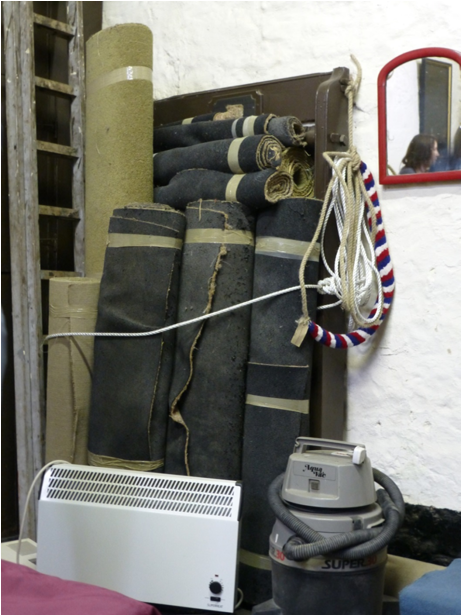
Perhaps over several decades, Church Wardens have used the ringing chamber to store all kinds of paraphernalia that has accumulated and been forgotten about. You might have a potentially lethal electrical heater that smells funny or a migraine-inducing 1960’s carpet. Or perhaps the bell team’s box of shabby Christmas decorations are wedged under a clock case next to a pile of broken bell muffles. In the worst case scenario, even your tin of chocolates are stale!
After a while we no longer notice how shabby and old-fashioned our ringing chambers are. But someone new will notice. What message exactly does having a funeral bier stored in the ringing chamber give? It's true, we have the picture.
So, if your tower is dingy and dirty, it doesn’t create a welcoming impression for a new ringer, so try to remember that cleaning is not just for Holy Week and a modern, well lit environment with contemporary photographs and news on the noticeboard is much more encouraging.
Things we take for granted
Even going up uneven spiral staircase can really freak people out! New recruits who are very thoughtful and sensible can be spooked no end just by the staircase!
And ringing itself. It is reasonable to wonder: "Is the bell you’re asking me to pull going to come crashing through the ceiling if I pull too hard?" Stand back and remember how much we take for granted.
On this subject, it is important to have a good relationship with the church when it comes to the ringing chamber as they may not immediately appreciate that it is a place where people are going to be feeling vulnerable and out of their comfort zones. And what is out of sight, might be to them out of mind. So if you don't have proper lighting, emergency lights, adequate power sockets, repaired windows and safe electrical heaters, it is incumbent on you to explain why they are needed when asking to get faculties or money.
A risk assessment is a really good way of getting everyone on the same wavelength about the importance of the ringing chamber and the need for safety. After all, safety and feeling secure are very important prerequisites for good learning.
4. Training and retaining your recruits
Research demonstrates that intensive training leads to faster learning. More of what has been learned is retained between sessions and ringers maintain enthusiasm as they feel they are progressing.
These days new recruits expect ‘courses’ and a defined, structured way of learning to ring. This is comparable to other hobbies – such as music grades or karate belts. Intensive training needs to be both frequent and concentrated.
Plan for 10 to 15 hours of one-on-one training per new recruit.
Throughout the phase of learning to handle the bell the ringer receives lots of individual attention. Once the ringer joins the normal weekly practice they will receive considerably less attention. The learning curve will plateau which may lead to a waning in interest and motivation.
Think about how you can provide targeted sessions and give your new ringers in as much rope time as possible to keep them progressing.
4.1. Intensive training
Not only do new recruits expect intensive training, but research clearly demonstrates that intensive training leads to faster learning. The more regularly a ringer attends practices, the quicker they learn to handle a bell competently, not just in terms of numbers of weeks elapsed but also in the number of hours they spend on the end of a bell rope. The more frequently an activity is practised the less is lost in between practices.
Intensive training is both frequent and concentrated so that more of what has been learned is retained between sessions.
Different versions of intensive training
It is likely that 10 to 15 hours will be needed to get your ringer to the stage where they can ring a bell independently, raise and lower a bell, set at hand or back at will and be ready to start ringing with others. Several handling lessons on successive days is ideal and twice a week should be considered the minimum.
Find out more about how long it takes to learn to ring.
Various ways of providing this intensive training have been successful:
- Two full days on consecutive Saturdays.
- Learn to ring in a weekend.
- Evenings (1½ hours) for a week or two.
- Afternoons (1½ hours) for a week or two.
- Group sessions over a concentrated period of time.
- A week’s course.
At the beginning of the intensive training set a date for ringing with others on untied bells – it is really motivating to have this to aim for. Enjoy the look on the new ringer’s face when they hear their bell for the first time!
When moving on to ringing with others, the extra concentration required is likely to result in less focus being placed on handling style. It is highly likely that further handling lessons will be needed when the ringer starts ringing with others to ensure development of good ringing style.
To charge or not to charge
This is a question that divides the bellringing community, but there is little doubt that most new recruits expect to be charged a significant amount for their training.
What can be achieved in a week?
They started on Monday and this is what they were like on the Friday, after 10 hours of tuition... a little bit of finessing to do but next step will be ringing with others.
Right at the beginning – the practical side
If teaching children or you should obtain a permission to ring form and be DBS checked. Ensure you always have another adult present. You should use sound control or silence the bell (using a rope, inner tube or motorcycle tyre) to ensure the handling training is not audible outside. Make sure your new ringer is aware of all safety issues and what to do if control is lost.
And afterwards?
High quality, intensive bell handling training, typically has a retention rate of about 80%
Many more ringers are lost in the period after this early bell handling stage, on their way to being able to ring their first couple of methods inside. Providing the right opportunities and support to your new ringers during this stage is vitally important. Ideally there needs to be an equivalent to intensive bell handling training right through to ringing methods, however this level of teaching intensity is difficult to maintain. There are different ways of keeping your new ringers interested through these foundation stages which other teachers have found work. You can find these in chapter 3.4 of this book. See if you can apply them in your tower or local area.
Intensive training the Maids Moreton way
I call it a recruitment exercise that went wrong. A tower open day generated 13 people who wanted to learn to ring. Whilst obviously a fantastic response, it also resulted in much scratching of heads in the planning meeting in the pub – how on earth were we going to capitalise on this bounty? The traditional way of teaching wasn’t going to work so we decided to do something completely different; we’d take intensive teaching to the extreme and commit to getting everyone up to ringing rounds on four within a month. This being a leap year February gave us 29 days! Lesley Belcher
St Martin’s Guild Summer Camp
We can confidently say all students delivered and were very close to completing Level One of the “Learning the Ropes” scheme. All could handle a bell and were beginning to ring in rounds by the Saturday outing. Some were even ringing call changes at Worcester Ringing Centre, something I would not have believed had you told me at the start of the week. Arthur Reeves
From nothing to open rounds in 3 weeks
When I decided to learn to ring nearly two years ago I did not know what to expect and how long it would take. Initially I went along early to a practice night at St Peter’s church in Kineton where I was given a tour of the bells and allowed to ring a couple of backstrokes on the silenced bells. After that I could only watch the more experienced ringers as they went about ringing all manner of complicated changes. I was sure it would take months of coming along and getting a few short goes on the end of the rope before I would be allowed to join in on an open bell “performance”.
However, this was not the case as the Ringing Centre in Kineton has a simulator which allows ringers to have a go on bells that are muffled with the sound being generated by a computer. I was therefore invited to take part in some intensive lessons where I received one on one instruction from the tower captain, Graham Nabb in bell handling. These sessions were all conducted on silenced bells so I could safely learn the necessary bell handling skills without annoying other ringers or more importantly the people living near to the church – I am sure that listening to an inexperienced ringer try to set the bell 10 times in a row hand AND back over and over again would soon alienate any locals! Moreover, knowing that no one could hear my 100th failed attempt at least lessened the frustration (a little).
After learning the basics of ringing a bell and coordinating both hand and backstrokes I was also able to practise ringing with other bells (where at least four bells were computer generated). Having access to practise for long sessions meant that I was able to solidify techniques quickly. This gave me the confidence required when it was finally time to ring with five other ringers on open bells at my first practice night just three weeks after my first tentative pull on a bell rope. I am sure that it would have taken months to get to this stage without the ability to have extended time on the end of the rope with only snatched goes in between more experienced ringers on a practice night.
The set up at the Edgehill Ringing Centre does not only benefit the rapid learning of the basic skills. It also enables ringers to have extended practice session when trying to learn new methods. The “moving ringers” were particularly useful in the development of that elusive “ropesight” when learning to ring the tenor behind for my first quarter peal. Cathryn Stokes
4.2. What do your new recruits expect?
At ART we receive not only requests to learn to ring but also desperate emails from new ringers who know that how they are being taught just isn’t right. These ringers aren’t giving up though, they like ringing, they want to ring and they are taking the time to ask for something better.
New ringers are expecting intensive training, not 15 or 20 minutes a week. They compare with what other (competitor) hobbies routinely provide and find what they are being offered is sadly lacking. People nowadays have lots of choice and high expectations. What they are asking for is proper coaching, just as they would if they were learning an instrument or a new sport.
Here’s what they have to say
I have recently answered an ad in a local mag called The Voice. The ad was to learn the art of bell ringing at [church named]. I have been on three occasions, twice with about five other complete beginners, and once with more experienced ringers. I think in all I have had half an hour’s tuition. I have had a telephone call this morning telling me that the next time I go I will be assessed as they do not think I am capable of becoming a bell ringer. This has disheartened and upset me. Is it that apparent, after so little tuition, to know whether or not a person will be able to gain the art of bell ringing?
I’ve started to ring at [church named] and am enjoying it. To supplement this, as I’m only doing this for 20 minutes per week, I was wondering if there was some sort of practical day’s course I could go on, as I need more practice at bell-ringing. Would there be any such course I could attend in the local area?
I have just started learning to ring (4 solo lessons and 4 group) and have got as far as being brought along for Sunday morning rounds. It looks as if I will get 15 min max of ringing time per week and compared with learning an instrument (I play cello, viola, bass and treble viol to an amateur level with spouse and a small group) this seems a bit thin. Some home practice would be helpful, so I have acquired AbelSim and am building a dumbbell – unfortunately, the locals decided a few years ago that they didn’t need a simulator, so I am likely to use it solo. It has been suggested by a ringing friend of my sister-in-law, that I go down the ART route, which is why I am contacting you.
It typically takes 10 to 15 hours to train someone sufficiently well to ring competent rounds with others. Intensive bell handling training is recommended. There are different ways of doing this depending on both you and your new recruit. Whichever route you take you should aim to have your recruit ringing with others within a month. Sometimes it can be within a week!
4.3. Why do ringers enjoy ringing?
Most ringers who persevere do so because they find something in ringing that motivates them. The ART Conference survey shows that these ringing teachers enjoyed ringing and the challenges that it threw at them. It was that that got them hooked. The trick for you is to find out what makes each of your ringers tick and give them plenty of opportunities to tick that box.
At the 2017 ART Conference a selection of ringing teachers (sample size = 83) were asked what made them keep ringing.
| Current Teachers | |
| Enjoy ringing | 35% |
| The challenge | 35% |
| The social side | 13% |
| Family | 13% |
| Duty to the Church | 7% |
| Friends | 6% |
| Community (want people to hear the bells) | - |
What keeps people ringing is different to what made them come to the tower in the first place (family and friends). It is easy to see why some people give up even if you’re the best teacher in the world and the band the most welcoming. Ringing isn’t what they thought it was and although it was an enjoyable experience, it wasn’t quite right for them.
When someone goes through a low patch try everything you can to get them through it, but if someone seems to be going through a long series of low patches maybe it is time to let them go gracefully, and let them be advocates of ringing and your tower. As a teacher, don’t take it personally.
What motivates ringers?
 Ringers are motivated in different ways. Some love to come along to focus on their own personal progress with change ringing, others feel that helping teach others is highly rewarding. Some ringers come for the mental challenge of method ringing, others enjoy ringing at a more basic level and like the social side. There are also some people who don’t prioritise personal advancement but just like to come and ring for services.
Ringers are motivated in different ways. Some love to come along to focus on their own personal progress with change ringing, others feel that helping teach others is highly rewarding. Some ringers come for the mental challenge of method ringing, others enjoy ringing at a more basic level and like the social side. There are also some people who don’t prioritise personal advancement but just like to come and ring for services.
Including a social element to your practices can be a big help and make the difference between someone wrapping up in lots of layers and turning up on a cold winter’s night to feeling that it’s very warm and cosy at home, that ‘they’ll probably have enough to ring without me’.
Going to the pub after practice, remembering people’s birthdays (bring cake to practice!), an annual group outing, team t shirts for the striking competition, a barbeque, a quiz team and a Christmas get together are all ways to help people feel connected to the group. There are plenty of social events and activities organised for young ringers, but team spirit is just as important for adults too. Enter striking competitions, run open days and fundraising events, attempt quarter peals, have picnics, play board games and get together as a team outside the tower.
Academics have studied the deeper reasons for people participating in hobbies and pastimes and this can be applied to bell ringing and bell ringers. Why not have a look at each of the ringers in your band, see what motivates them and how you can give them with more opportunities to feel fulfilled.
Affiliation – feeling part of a group
A desire to have positive and friendly relationships with others; to be part of a group. Such ringers will be loyal Sunday Service ringers but may not be motivated to progress very far with learning methods. You should ensure they feel a valued member of the band, perhaps having a special role, be it formal, such as Social Secretary or informal, such as having responsibility for opening up for visiting ringers or winding the church clock.
Mastery – being very good at what they do
Such ringers wish to improve their skills, master new skills and generally pursue excellence. These ringers want to do something well for its own sake. This is the group from whom our expert ringers are likely to develop. These ringers will be keen to improve their striking, and they will respond well to goals, such as ringing quarter peals and peals.
Sensation – enjoying the physical side of ringing
These ringers gain their pleasure from the very act of ringing bells. You should take these ringers to other towers or to group practices and later should arrange outings and tours for them. When more experienced, learning a variety of new methods will hold their interest.
Self-direction – want to be in charge
Ringers who fall into this category wish to feel a sense of control or to be in charge. You should provide a position of responsibility or create a situation where they have certain decision making powers – standing behind less experienced ringers, calling things or organising quarter peals or social events.
Social comparison – want to be the best
Such people participate in an activity because it provides them with an opportunity to compare themselves with others. These people are most happy when they can demonstrate that they are better than somebody else. These ringers will enjoy striking competitions and enjoy being high up on the annual list of peal ringers. They may seek out an environment where they are able to demonstrate that they are better than others and may prefer to be a “big fish in a small pond”.
4.4. Keeping your new ringers interested
Sometimes you hear people say that bell ringing doesn't have a recruitment problem, it has a retention crisis. Which is hard on those who struggle to get new recruits into their tower, but there is some truth to this.
High quality, intensive bell handling training, typically has a retention rate of about 80% Many more ringers are lost in the period after this early bell handling stage on their way to being able to ring their first couple of methods inside. Providing the right opportunities and support to your new ringers during this stage is vitally important.
The challenge of becoming part of the group
Now your new ringer will transition from having considerable time spent with them on an individual basis to start ringing with others - the fun bit! But making that transition from having regular time with one teacher to joining in with a general practice can be difficult.
First, ringers have been used to getting plenty of attention by themselves, making rapid progress, achieving their Learning the Ropes Level 1 within a short time and ticking off lots of things in their progress books. They're probably enjoying their success and are keen to move on to the next stage. If they then go along to a general practice once a week, they will be getting a go at something new such as rounds and Call Changes, or Kaleidoscope ringing throughout the practice, but as everyone else's needs have to be catered for, their progress will slow down.
It is at this stage that many promising ringers lose interest or become frustrated. ART receives regular emails from people all over the country who have been ringing for several months but who aren't getting many opportunities to develop their foundation skills. As they are not ready to join in with the methods that the rest of the band ring, they spend much of the practice sitting out feeling excluded.
Maintain momentum
Joining the practice after all the attention of bell handling lessons can easily lead to slow progress and loss of enthusiasm. Maintain momentum and provide as much practice as you can, at your own tower, with other towers (be selective) and through your local ringing association.
Be careful though. Don't be tempted to push them too far, too quickly. This is the time to get the foundation skills, which we take for granted, right so that your ringers can progress more quickly and further later on. Avoid the mistake of jumping from call changes straight into Plain Hunt, in the belief that this will make them feel they are progressing. Confidence can easily be lost and along with it, the ringer too.
Teach in groups
As the new ringer in the tower, they may well be the worst ringer for a long time. How demotivating is that, particularly when things aren't going right. Create group teaching opportunities - the peer support and opportunity to see that they are not the only one who finds ringing difficult, keeps people coming back.
Create a sense of progress and celebrate achievements
Just as more experienced ringers have goals to keep them motivated (such as ringing a quarter peal of a new method), so people who are new to ringing feel a sense of achievement from attaining something they've been working towards. Set realistic goals and celebrate success in ways that suit the ringer and the band.
Help people feel part of the band
Find out what makes your new ringers click, then give them what they want – a role within the band and teaching and opportunities that suit their aspirations and motivations. It's much harder to drop out of an activity and stay home if you've got lots of friends doing it.
Use a ringing simulator
Regular simulator sessions focused on developing and finessing foundation skills are a way of developing a number of ringers with only a few helpers.
Most new ringers are able to hear their bell with just a little of the right practice. All too often they are conditioned to "watch" so their natural listening skills are suppressed. A simulator is a valuable tool to make best use of helper time, and is very useful in the transition from handling sessions to ringing with real ringers and beyond.
50 Ringing Things
The challenge is perfect for those who can handle a bell safely and ring rounds competently.
Although Annie's ringing progress has been at quite a stately pace she picked up a 50 Ringing Things booklet and has been on a series of amazing adventures with ringing ever since. She goes all over the place ticking off the challenges.
Annie rings respectable call changes at her home tower every Sunday and never misses a practice, but is realistic that she's unlikely to become an advanced change ringer any time soon, so she worked out that challenges such as 'ringing a themed method' or 'calling a quarter peal' weren't going to be possible. She then wrote out a chart with all the things she could do and went for it.
Annie has got her bronze certificate and she is going all over the place fulfilling challenges. She absolutely LOVES the scheme and just texted me that this weekend she had gone along to a practice at St Alban's Abbey (ring at a Cathedral or Abbey) then drove to a nearby village to attend a village fete where the Charmborough ring was set up so she could tick off 'ringing on a mini ring'.
She organised an outing for all of us (including making us ring at a lumpy 4 because she wanted to ring at a 4-bell tower), rang at a wedding, she's going on the next bell maintenance workshop, she cleaned the tower, is going to be ringing another quarter peal on the tenor next month, made a ringers' tea, raised funds for the tower, given a talk on bell ringing to a group. Basically she is targeting any of the challenges which are attainable by someone whose own personal ringing ability is at an early stage.
4.5. Learning in groups
Group learning provides two key benefits to new ringers – peer support and a feeling of being invested in and hence valued. And that investment pays off; retention rates are higher when people are taught together.
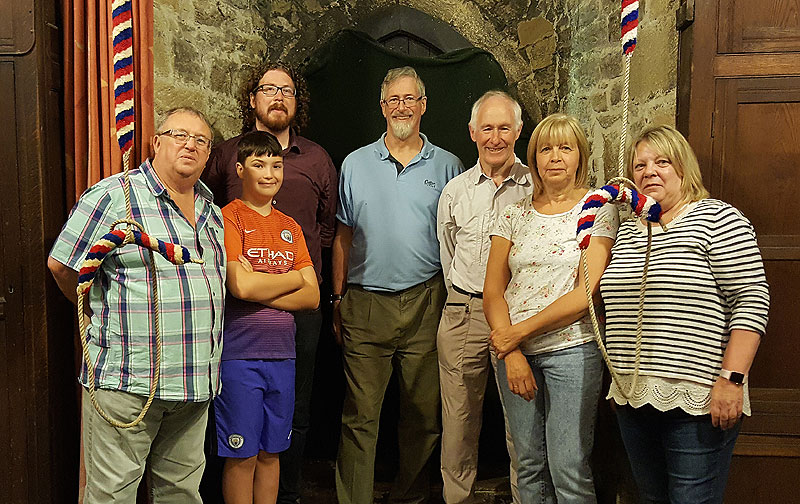
Recruit and teach new ringers together in a group
Teaching a group of three or more new ringers in the same tower, at the same time, provides a group learning experience. This can be more disruptive to the existing ringers, however if the band has become depleted over the years this is less of an issue; in fact there is little choice.
What you notice is the atmosphere in the tower. There is a real buzz – coming from the sense of camaraderie and achievement that such projects generate. People don't stop coming because they don't think they are making any progress or because they are holding other ringers back. They see the other new ringers going through low points just as they do and support each other through them.
Centralised bell handling teaching
Teaching one or more new ringers at a central teaching tower minimises disruption to existing practices, allows good, enthusiastic bell handling teachers to teach more new ringers (more efficient use of skills) and can provide the benefits of a group learning environment
A number of models exist. The simplest consists of a single bell handling teacher who teaches all the new recruits for the other towers in the benefice. New recruits are trained to a high standard and then fed into surrounding towers with supportive bands and good teachers to take them on into method ringing. A network of ringers is created across all the towers with different teachers and skills being utilised throughout the learning process. At the other extreme is the Ringing School in which small groups of ringers are developed at a central tower, starting with learning to handle a bell to ringing methods.
Partnership and trust are key. Teachers invest a lot of time teaching new ringers who won't be members of their band, so they need to know that the bands that these ringers go onto ring with, will be able to develop and retain them when they are passed on. On the other hand, these towers must trust the teachers not to poach their new recruits!
Groups of towers working together
Groups of towers can form a hub or cluster or ringing centre. The group offers multiple practices, some of which can be targeted. For example each tower might not be able to run a youth practice, but together they could. The same for an advanced practice. Ringers can go to practices which fit in with their work and family schedules and change as these change, without feeling they are deserting their home tower or stopping ringing because of shyness.
Group learning is encouraged by the targeted practices and the scale of the group, providing the peer support and a feeling of being invested in, which are key to keeping new ringers ringing. And that investment pays off; retention rates are higher when people are taught together.
Foundation skills practices and workshops
In the same way special dedicated practices are organised for method ringing, successful towers also organise entry-level practices and workshops to develop foundation skills. This can be on a separate evening, or fortnightly on a weekend. If you advertise it locally it will almost certainly be of interest to new ringers from the whole area. Word spreads quickly and such practices become very popular. So be careful, you want enough to have a vibrant practice but not too many that the ringers for whom you set up the practice, don't get enough time on the end of the rope.
Encourage your ringers to form a group using social media, outings and social events.
What do ringers and teachers say?
One of the most important aspects has been able to learn alongside people at a similar level of ringing. Peer support throughout the groups has been fantastic and as an older learner does make you realise that everyone has similar concerns and that no one is too old to get involved with something completely different.
I would have given up long ago. Thank you to all the helpers and to my fellow students for their help and support.
A decision needs to be made by the whole band though: it is a big time commitment and not just by the one or two people specifically teaching the learners, especially if you have more than a couple of learners: which I think was helpful as they were able to support and learn from each other.
4.6. Foundation skills practices
In the same way as we organise special dedicated practices for method ringing, successful towers also organise entry level practices to develop foundation skills. This can be on a separate evening, or fortnightly on a weekend – but if you advertise it locally it will almost certainly be of interest to new ringers from the whole area. Word spreads quickly and such practices become very popular.
Ideas for teaching foundation skills
Continue with a separate tied bell session after the ringer joins the main practice session. Note that tied bell sessions alone do not provide the opportunity to develop all the necessary foundation skills.
Have a tied bell session before Sunday service ringing.
Hold an early ringers’ session before the main practice. It may be easier to get helpers at this time.
Organise an additional separate early ringers’ practice. It may be possible to gather learners together from more than one tower. This could perhaps be done at Branch or Guild level or at a Ringing Centre.
Arrange for practice sessions using a simulator, which means skills can be built with very few helpers. With two helpers and one tutor, skills can be built using 3 or 4 bells. With a group of three ringers, one hour can provide good practice for them all. Ringing rounds on larger numbers of bells by ear with the rest of the bells being rung by the simulator will ensure that the ringer still learns to hear the full compass of bells on 6 or 8.
Run early ringers courses weekly over 6 to 8 weeks. In this way it may be possible to meet the requirements of different types of learners. Retired ringers may prefer a daytime session. Young ringers may benefit from an early evening session when they are not so tired. Saturday mornings might suit families better.
Why are foundation skills practices so popular?
Clearly there is a high demand for an entry-level practice, just as people might travel for a monthly Surprise Minor practice, or a regular 10-bell practice. As specialist foundation skills practices are fairly uncommon, it is obvious that ringers feel it is extremely beneficial. Dedicated foundation level practices can more quickly help ringers make a transition from rounds to Plain Hunt, and this is a crucial stage where successful towers and branches can help new ringers to stay motivated.
Be careful though. Don't be tempted to push new ringers too far, too quickly. This is the time to get the foundation skills, which we take for granted, right so that your ringers can progress more quickly and further later on. Avoid the mistake of jumping from call changes straight into Plain Hunt, in the belief that this will make them feel they are progressing. Confidence can easily be lost and along with it, the ringer too.
Provide practices which engage early ringers for the majority of the session.
The Marworth experience
A few months ago, a gentleman from some distance away who had recently learnt to ring, contacted me to find out if I could offer some intensive lessons because he felt he was not progressing in his local tower. It was a story I have heard before. He gets 5 or 10 minutes’ practice a week and the remainder of the time sits down while the rest of the team ring their more advanced stuff.
After some correspondence and telephone conversations, I ascertained that he could handle a bell reasonably competently and could ring in rounds and call changes, although he sometimes lost track of the calls. In addition to some exercises to help improve his ringing technique, I diagnosed the main problem as lack of what we call “foundation skills” – that is, the set of techniques which are necessary to progress from rounds to Plain Hunt.
It so happened that, at about the same time, we held an ART Module 2F course at Marsworth. Two local ringers decided to come on the course and I agreed to mentor them. Having completed the day course, they were then left with the challenge of finding ways to practise and develop the skills they had been learning. Neither was a Tower Captain so it wasn’t just a case of getting on with practices. They decided to run a joint practice at one of the towers on a monthly basis and advertise it to the local ringers as an additional practice once a month on a Saturday morning specifically for foundation skills.
The practices were an instant success! One also has to bear in mind that we are situated on the border of three Counties – and three Dioceses which fall within three different ringing Associations – and are therefore some distance from the “centres” of each. None were known to have any regular practices aimed solely at developing foundation skills anyway. The practices have regularly drawn a dozen participants from local towers in all three counties who were struggling to make the transition from call changes to Plain Hunt. All have made significant progress as a result.
This led me back to my enquirer. I suggested he came over for a couple of days, as he was very willing to find a hotel for a couple of nights, when I could give some one to one handling tuition and he could come along to the foundation skills practice; there was also an opportunity to take part in Sunday Service ringing before he returned home. We also did some exercises ringing with our simulator, which he thought was a wonderful tool. I suggested that he should try to find other practices in his locality where he may get more practice and to find out what was available from his local ringing association.
This prompted me to look at practices on offer through various ringing associations. Most associations hold practices for novices where the emphasis is on rounds and call changes, and others for method ringing. The latter can be split between what we might call elementary change ringing, e.g. Plain Bob Doubles, Plain Bob Minor & Grandsire, and more advanced ringing, especially Surprise methods. I only found one Branch which had a regular foundations skills practice.
Why is it that this essential stage in ringing development is paid so little attention? Ok, many towers do things like making places and dodging practice as an extension of call changes, but that’s about it. If people can’t progress from call changes, they will get frustrated and that’s when they are liable to give up. Foundation skills are so important, yet frequently ignored.
Richard Booth, Marsworth
5. Keeping everybody happy
At this stage you have some new ringers and you have your existing ringers. It is vital that at the same time as instructing new ringers in the arcane mysteries of handling a large piece of metal swinging some distance above their heads that you also remember your existing ringers.
Whilst they may not be part of the team of instructors, which is one way of keeping them engaged, they need to be come part of the environment of learning for the new ringers. They also have development needs and wants.
Neglacting your current ringers in favour of new ones is a sure way of emptying your tower.
In the following chapters we lay out some of the issues you should bear in mind.
5.1. A very popular practice
If your new recruits are really doing well, the chances are you’ve considered running some dedicated foundation skills practices to help them progress more quickly, possibly with group teaching. If you’re running these practices really well, you’re planning them ahead, you might have some experienced helpers, everyone gets chances to ring something they want to, your ringers are enjoying themselves, attaining goals and feel that they are making progress. Brilliant!
But hang on! Just as more advanced ringers tend to flock towards good practices, word does spread quite quickly and you might well find that new ringers from other towers will start to come along too. Whilst visiting ringers are always a pleasure, it’s also possible that what started out as a small, local practice can easily become overwhelmed by lots of visitors, especially if they don’t have the luxury of a foundation level practice in their home tower.
So if your practice which comfortably catered for 8 people suddenly has a regular attendance of 20 or even 30, what can happen? Your own ringers, for whom you set up the practice in the first place, might well only get one or two rings in an evening and their progress will slow. You can become frustrated, wondering why you're teaching everyone else’s learners at the expense of your own. Your practice has become too popular!
There isn’t one easy solution to this tricky situation, after all you don’t want to exclude people. Start by talking to your home band, including your more long-term visitors. Ask their opinion. Try and find a solution that works for both your team and everyone else. Remember:
- Stop doing things that aren't working
- Look after yourself
- Refocus on your own ringers
- Identify other teachers and helpers
- Be creative
You never know what could happen; this is how the Birmingham School of Bell Ringing started!
Collaborate
Would other towers in the area like to collaborate and run some similar practices to cater for demand, perhaps on a different evening?
There are probably plenty of good teachers in your area who would be willing to help. They might not be doing much teaching due to a lack of new ringers at their own towers so could well be keen to help with some joint practices to benefit the wider area.
Would your Branch or Association be prepared to run a regular session to ease congestion?
Form a ringing hub or cluster
How about forming a ringing cluster with local towers. Running as a hub allows a range of practices targeted at different ringers to be run throughout the week.
Encourage slightly more advanced ringers to come along as helpers to practices aimed at people who are at an earlier stage. In this way you will be training up the teachers of the future. In return, make sure you can also offer them their own dedicated practice for something more advanced. Encourage a culture of ‘give and take’ so that everyone benefits.
Hold workshops
Rather than running a general open practice, consider holding regular, focused workshops. The name workshop rather than practice has different connotations. Be open; tell everyone...and be clear: "Next Tuesday is Plain Hunt skills for these five people." Arrange a series of workshops for different groups to ring something they are working on. That way, it’s fair, everyone gets their own special practice or if already competent they can come along as a helper, and your practices will be more focused and productive.
Take a break
If you feel the practices have lost their way and you can't find a solution, consider taking a break (maybe coinciding with when you go on holiday) then start again with things run slightly differently. Hold themed practices for small groups by invitation to manage the sessions and number of ringers. If anyone complains, invite them to run something!
5.2. Making recruitment work for everyone in the band
Everyone sees recruitment and new ringers as a “good thing” and there is definitely a lot of talk about how we need to recruit new, often young, ringers to ensure the future of bell ringing. All the talk is about “how to make teaching work for these new ringers”. What gets neglected is that for some people and bands, such activities can be disruptive and put them off their hobby. Not because they are people with bad attitudes but because to train people up properly takes a lot of time and commitment. This may not have been required in the past because the teaching, if it happened at all, was less intense than it is required to be nowadays to retain a fair number of ringers.
Think about everyone in the band
New recruitsg>need time on the end of the rope, varied teaching and perseverance to succeed. Support from other new ringers is a key retention driver. How do you provide that in a band when virtually every other ringer is so much better than them?
Teachers need to commit over a long period of time. They can put so much into developing individual ringers they can suffer from burn-out.
Other members of the band will naturally have less time on the rope at the practice. This is probably ok in the short-term but it takes years to produce a good method ringer and unless they are looked after, other band members can start to get fed up with this.
So what are the options?
Carrying on as you always have will produce the same results as you always have (there’s a famous quote there somewhere). So if you’ve been able to train and retain a steady stream of new ringers and kept a happy band in the past, then carry on. If, however, most or all of your new recruits drift away or come along but stagnate, you might consider doing things differently.
You could be brutally honest, decide you’re not a teaching tower and kindly introduce anyone who approaches you to learn to ring to a more learner-friendly tower. Even better, offer to do the introductions and take them along to meet the band or Tower Captain (ensuring they don’t get cold feet after an initial rejection). Don’t expect them to come back to you when they are trained up, but feel good that you are doing them and bell ringing a service by giving them the best chance of learning to ring and sticking at it. This is a brave decision to take, as there is an unwritten expectation that all towers will teach, however it doesn’t have to be forever. Circumstances change – ringers retire and feel that they “want to give something back” or the band starts ageing and has to recruit or it will stop ringing.
Alternatively you can decide to do things differently. Not only putting lots of energy into your new ringers (feeling anxious not to lose them) but also equally importantly putting thought and time into maintaining the motivation and enjoyment of your existing ringers and regular visitors who used to come to your practice because it was more advanced. How about:
- A monthly advanced practice run on an invitation only basis.
- Regular quarter peal and peal attempts.
- Combining with another local tower or cluster to organise special practices on a particular method or aspect of ringing, such as conducting or composition.
- Splitting your practice night so that the last half hour is always reserved for more advanced ringing – new ringers can of course stay to watch and listen if they wish, but they’ll be doing their own ringing earlier on.
- Making Sunday Service ringing by invitation only so that the band has an opportunity to ring longer touches of methods.
- Ensuring that everyone present at the practice gets to ring at least one touch of something they’d like to ring if possible … with a steady band, not just a quick plain course of something at the end as an afterthought.
A lot (probably too much) for one person to organise, so delegation will be required. This is not a bad thing as no-one has a monopoly on good teaching, leadership and organisation.
The Bob Doubles effect
5.3. Teacher burn-out
So your recruitment campaign has gone well, several new learners have signed up, you’re enjoying teaching them and it’s very rewarding to observe the progress they are making. Everyone should be delighted, but there’s something to watch out for which even the most enthusiastic and committed teachers can experience – burn-out.
Burn-out occurs when a teacher is putting considerable effort into teaching learners as an ongoing commitment, perhaps on several evenings a week, then feeling too exhausted to go out and enjoy their own ringing activities.
In an effort to retain these precious new ringers at all costs, the teacher might be bending over backwards to accommodate them all as some individuals progress more quickly than others and need different practice opportunities to keep things interesting.
What are the warning signs?
- Feeling overwhelmed and exhausted
- Feeling trapped in a cycle of having to please all the ringers, fear of them giving up if you don’t provide them with enough opportunities to progress.
- Waning enthusiasm
- Feeling alone
- Neglecting own ringing which was previously enjoyed
- Physical tension and strain injuries
- Feeling resentment and anger if ringers don’t seem as enthusiastic or give up ringing ‘after all my efforts’.
- Needing a break but feeling too conscientious to cancel a practice
And what if your ringers do give up?
Sometimes, despite your best efforts and exemplary teaching, coaching and band management, ringers do just give up.
Often this is not a reflection on your teaching but due to personal circumstances. A new relationship, work commitments, moving house, other hobbies that takes place on the same evening, pregnancy or any change of life circumstances can mean someone gives up ringing – sometimes for a short while, sometimes permanently. It’s easy to feel despondent if you’ve spent months and years recruiting and training new ringers, only for your once promising band to dwindle down to just a handful or even nobody at all.
This can lead to feeling disillusioned and resentful. After all that work, some teachers don’t feel inclined to start recruiting all over again.
What can you do about it?
Recognise these symptoms? If so, the most important thing to know is:
You're not alone. Mention these feelings to any dedicated and active ringing teacher and they'll nod their heads in agreement. They've been there too!
And you can and should do something about it. Teaching in groups where the burden is shared is obviously ideal, and collaborating with other local towers who can help by running combined practices or workshops can benefit everyone.
Or maybe you need to focus. If you've spread yourself too thin and are doing too much, how about thinking of each activity as a project you've piloted? In this way you can step back, decide if they're working for the the ringers attending them. If they're not stop them and if they are work out how you can get others to "step up to mark" and take over running them. They might do things differently to you, but maybe that is a good thing, and at least you don't blow up. You can then concentrate on the projects that are dearest to your heart and get some balance back into your ringing.
Finally ask for help and support. Having a ringing friend who you can share ideas and frustrations with, can go a long way towards maintaining your sanity.
I used to get upset when ringers gave up, but then I saw that it happened to others too. I have seen trainers really show love and care to their pupils, putting themselves out to teach even when they did not feel quite up to it. And then the pupil just says “Thanks, but I don’t find it interesting any more”. It is a shame, but that’s life.
In my opinion, this is largely not up to you! People will give up for all sorts of reasons (work, illness, boy/girlfriend trouble, time pressure) that you really can’t do anything about. If they find ringing interesting of itself, they will stay almost in spite of anything you do. If they don’t find it interesting of itself, they won’t stay whatever you do!
5.4. Groups of towers working together
The concept of group teaching allows good, open-minded teachers to do more, better. But it is more than that. By working together, teachers learn from each other, by observation and through coaching. They also provide the key benefits of group learning – peer support and a feeling of being invested in and valued. And that investment pays off; retention rates are higher when people are taught together.
Group teaching is a safe environment in which teachers are given opportunities to try new things out or to run only a part of a practice. By training up the next generation of teachers you will eventually be able to teach more ringers through them. That is a much better model than opening up your practice to lots of learners – which usually results in burn-out.
The formation of teaching groups depends on strong pre-existing ringing relationships. It’s nothing to do with geography or drawing lines on maps. Conversations are driven by a desire to do something better by doing something different, along with an understanding that by pooling resources and specialising they can do more, better. It is less stressful – teachers cover for each other, sharing the burden and not having to do everything.
The groups develop over time and unexpected things can happen which means what actually develops is different to the original idea. Often this has can have positive consequences.
Generate an ethos early on that teaching is a normal part of ringing, and create lots of opportunities for people to help and try things out. The enthusiastic ones will form the next generation of teachers – sometimes surprisingly quickly. Group teaching is not just about new or young ringers. It is about everyone and gives better opportunities to advanced or elite ringers, such as quarter peals and advanced practices.
Form a ringing centre
ART supports and encourages groups of teachers who regularly teach together at ART Teaching Centres and Hubs. Find out more about who they are and what they do
Run targeted practices
Group teaching provides more opportunities to run targeted practices – for young ringers, advanced practices or ringing on higher numbers. Run a programme of quarter peals.
Use people's non-ringing skills
Even the newest ringers can contribute in areas such as organisation, branding and communication. They will feel part of the team and sharing the workload depending on people’s lives and schedules is also a great relief!
Share the burden
Sharing the burden as leaders makes it more fun for everyone. So the hub allows them to teach much more how they’d like to (targeted practices) without having to organise and do everything themselves.
Build a separate identity
Create something that the ringers feel proud to belong to. Design a logo which is used on certificates (LtR levels and quarter peals). Have a website or Facebook presence or produce a monthly newsletter contains stories and contributions from ringers of all abilities.
Cross geographical boundaries
Towers can find themselves in a neglected corner at the edge of a number of territorial ringing societies with boundaries which get in the way – “we ring with our branch”. Group teaching can overcome these unhelpful boundaries.
Include ringers of all abilities
Demolish barriers between elite and new ringers by building something that works for everyone. Creating and advertising a professional and progressive group teaching organisation will appeal to elite ringers who want to make a difference. Concentrate on striking – it is a fundamental skill not just for the elites.
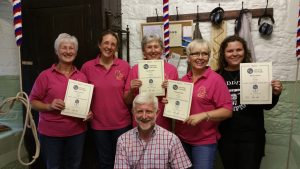 Four years on, my original four learners are all still ringing. We currently have a team of 8 ringers, plus 3 new learners. We don’t have as many helpers as we’d like, and it can take a long time for learners to master something new without having experienced ringers around them. I think the team has bonded more strongly than usual though, from facing these challenges together, and ringers often get cheers or applause from the team when they accomplish something for the first time. Ginette Pardoe
Four years on, my original four learners are all still ringing. We currently have a team of 8 ringers, plus 3 new learners. We don’t have as many helpers as we’d like, and it can take a long time for learners to master something new without having experienced ringers around them. I think the team has bonded more strongly than usual though, from facing these challenges together, and ringers often get cheers or applause from the team when they accomplish something for the first time. Ginette Pardoe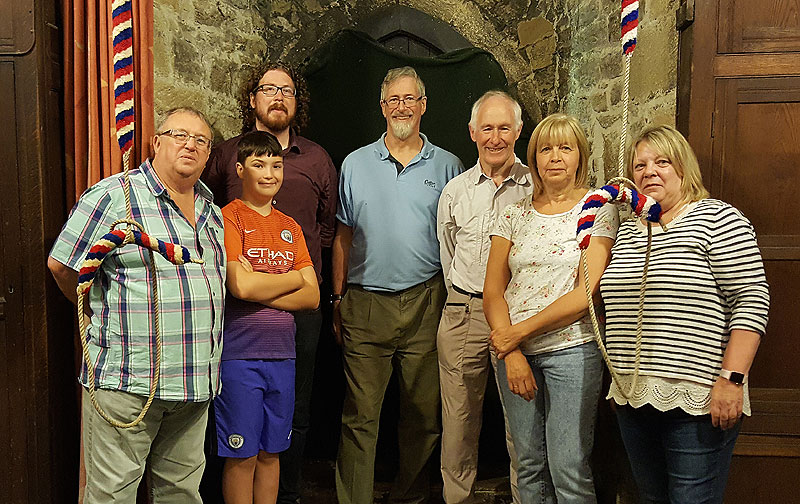
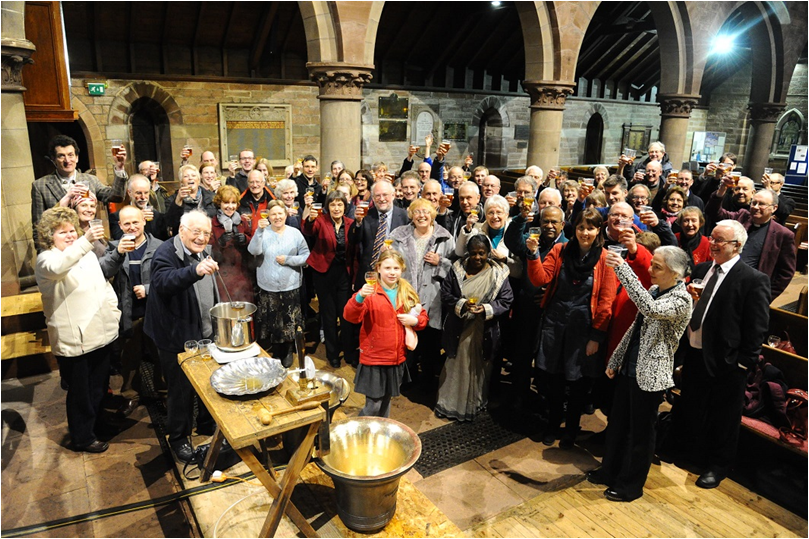
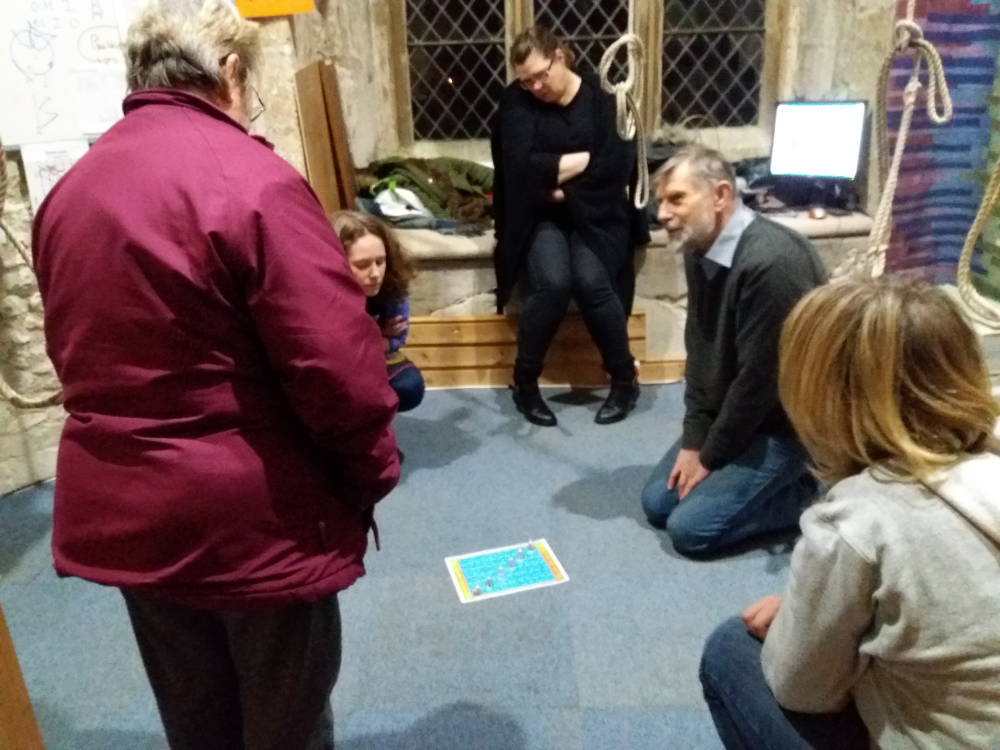
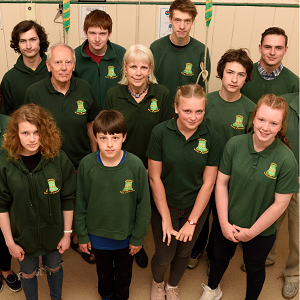 I have used various approaches to recruit young ringers. I confess that I find the most effective way of
I have used various approaches to recruit young ringers. I confess that I find the most effective way of  Arranged by the Cathedral, this event was the largest festival of its type to be held outside of London. The number of displays were too numerous to mention all, but included embroidery, glove–making, clock making, saddlery, flower arranging, stained glass, calligraphy, stone masonry, wood turning, lead plumbing, and of course… bellringing.
Arranged by the Cathedral, this event was the largest festival of its type to be held outside of London. The number of displays were too numerous to mention all, but included embroidery, glove–making, clock making, saddlery, flower arranging, stained glass, calligraphy, stone masonry, wood turning, lead plumbing, and of course… bellringing. 

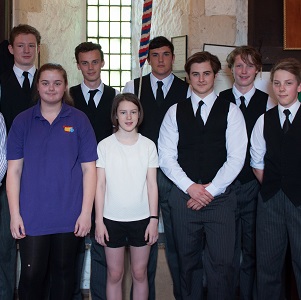

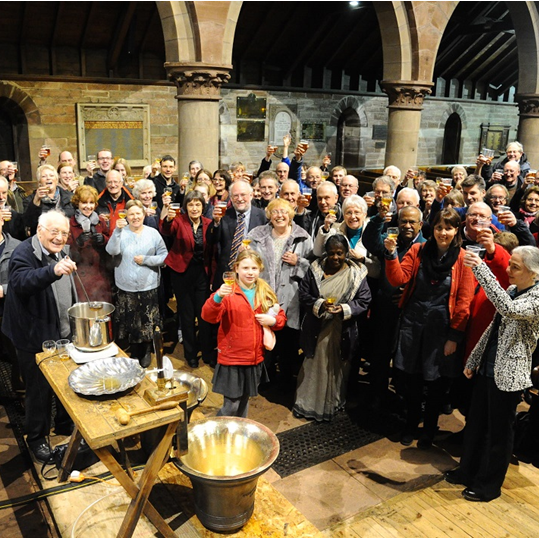

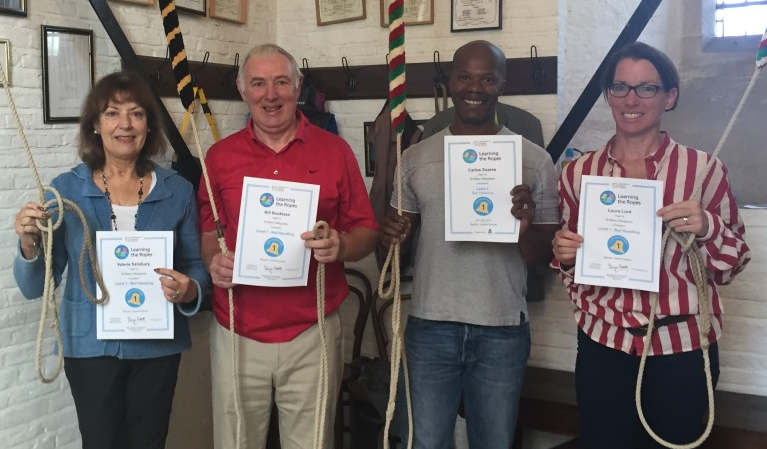 Learning the Ropes
Learning the Ropes